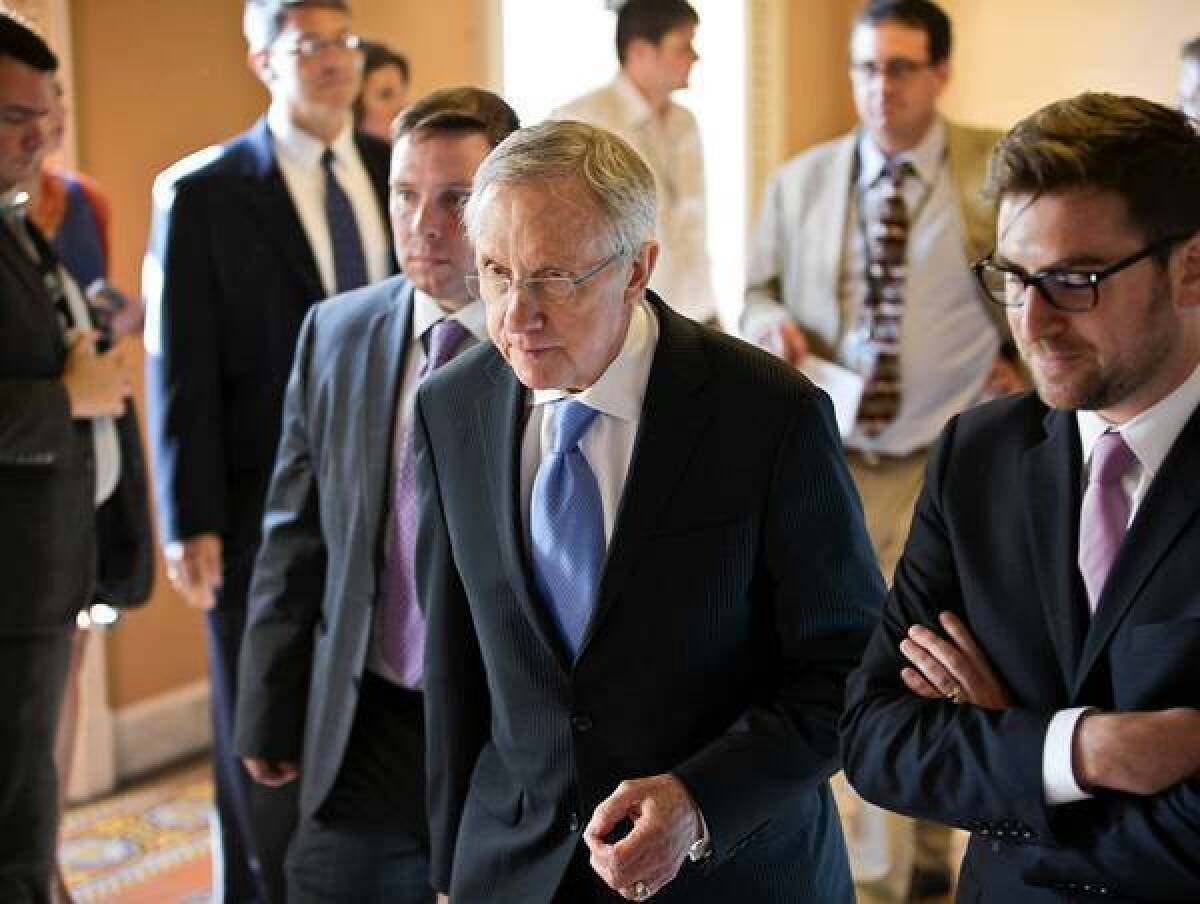Senate prepares for filibuster showdown

- Share via
WASHINGTON — Senate Democrats appear poised to attempt the most significant change to the chamber’s rules in nearly four decades: ending the ability of the minority party to block executive branch nominations.
The showdown could come Tuesday after a last-minute effort to negotiate a deal appeared to come up short. But several senators said talks were continuing.
Emerging from a closed-door, 31/2 -hour meeting of nearly all senators Monday evening in the Old Senate Chamber, Sen. Richard J. Durbin of Illinois, the second-ranking Democrat, said there “was a good feeling” in the room, “but at the end of the day we didn’t come up with a solution.”
The Senate requires 60 votes to end debate on any action, allowing 41 senators to block decisions. Democratic leaders say Republicans have abused the rules to stall too many of President Obama’s nominees for too long. Unless the GOP agrees to confirmation votes on seven posts Tuesday, Democrats say they will move to change the rules and allow a simple majority to end debate on nominees for executive branch jobs.
Ending debate normally requires 60 votes, and changing Senate rules, 67. But Democrats say precedent exists to make rule changes with 51, a simple majority. Senators refer to that as the “nuclear option” for its potential to blow up the Senate. Republicans threatened a similar move during George W. Bush’s presidency but backed off at the last minute.
Sen. John McCain (R-Ariz.), who played a chief role in negotiating that earlier deal, said after Monday’s meeting that talks would continue, “but I’m afraid that the majority leader may schedule a vote unless we reach some agreement.”
Senate Majority Leader Harry Reid (D-Nev.), in a statement terse even by his laconic standards, told reporters after the meeting that he planned to schedule votes on several nominations first thing Tuesday.
Democratic senators argue that Republicans have used the filibuster in an effort to hamstring the administration.
Sen. Tom Harkin (D-Iowa) told reporters Monday about a conversation he had with Obama during last year’s campaign, when the president was en route to Harkin’s home state.
“If we don’t do something, if we don’t change the filibuster, you might as well take a four-year vacation,” Harkin said he told Obama.
Before Monday’s meeting, Reid struck a defiant tone, saying Republicans had abused the Senate’s constitutional mandate of “advise and consent” with regard to presidential nominations and replaced it with “obstruct and delay.”
Reid said the filibuster in its current form would continue to apply to judicial nominations, which unlike administration posts are lifetime appointments, and to legislation. Other senators have said, however, that once the precedent of changing the rules by majority vote was established, those other forms of filibuster inevitably would be eliminated before long.
“The power of an extreme minority now threatens the very integrity of this institution,” Reid said Monday morning at a liberal think tank, the Center for American Progress.
“My efforts are directed to save the Senate from becoming obsolete, to remain relevant and effective as an institution,” he said. “To do that, the Senate must evolve to meet the challenges of modern-day America. This is really a moment in history when circumstances dictate the need for change.”
Reid scheduled votes Tuesday morning to force the issue on members of the National Labor Relations Board and the heads of the Consumer Financial Protection Bureau, Labor Department and Environmental Protection Agency. If Republicans block one of those nominees, he could press forward with the rule change.
Several senators said Republicans were ready to give in on five of the nominees but had drawn the line at two Democratic nominations to the labor board. Those nominees currently serve on the NLRB because Obama appointed them during a Senate recess.
Republicans challenged those recess appointments in court and won an appellate ruling that Obama had exceeded his power under the Constitution. They contend that confirming the nominees would ratify an executive action they consider illegal.
After his speech, Reid met in his Senate office with his Republican counterpart, Mitch McConnell of Kentucky, and White House Chief of Staff Denis McDonough to discuss a possible compromise that could involve having Obama make new choices for the labor board.
As he headed to the closed-door Senate meeting, McCain expressed optimism that an agreement could be reached and said there was support from both Republicans and Democrats.
“I’ve been in conversations with the White House about it. They’d like to see it resolved as well. But they know it’s largely a Senate issue,” he said.
The right of senators to engage in unlimited debate has been guarded by its members for most of the Senate’s existence. The first procedural attempt to institute limits came in 1917, when a tool known as cloture allowed a two-thirds vote to end debate. In 1975, that supermajority was reduced to three-fifths.
More to Read
Sign up for Essential California
The most important California stories and recommendations in your inbox every morning.
You may occasionally receive promotional content from the Los Angeles Times.














